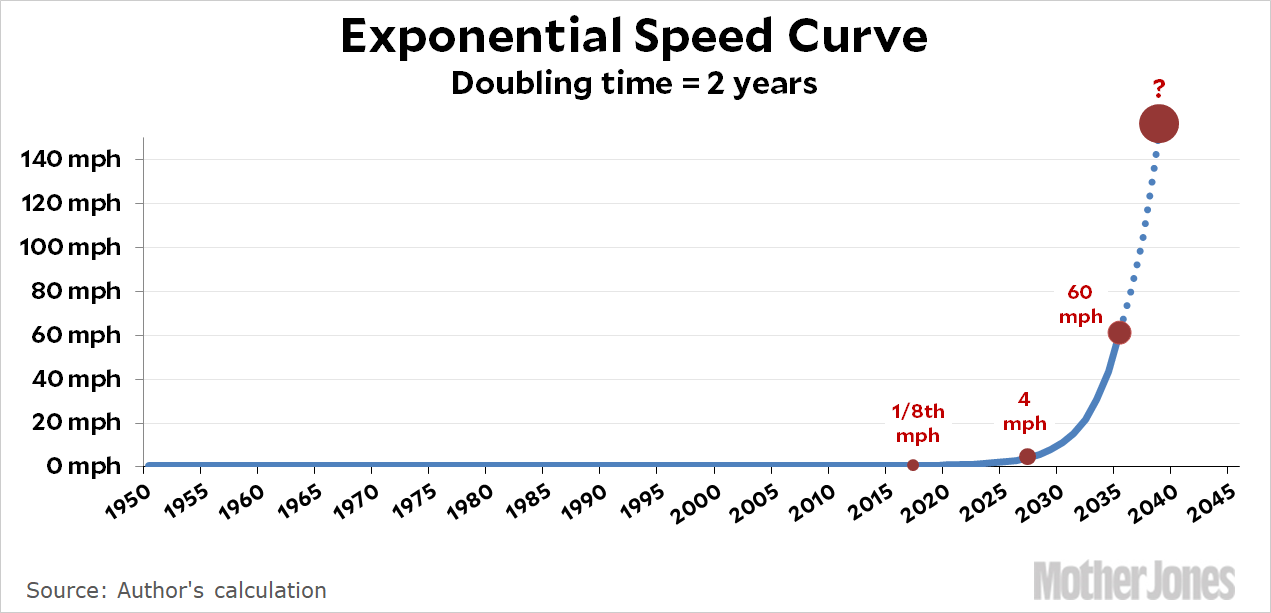Earlier today I wrote about the development of artificial intelligence and how it will cause mass unemployment starting around 2025. There was some pushback on Twitter, and as usual it took two forms:
- No way. Artificial intelligence is still very far away.
- Sure, AI will be smart. That’s bad news for accountants and truck drivers. But it will never be creative or sociable. People will still prefer human waiters, human manicurists, etc.
It’s possible that true AI is very far away. But not likely. Just look around: it’s obviously moving ahead in leaps and bounds already. Your average smartphone today is nearly as good at answering random questions as Watson was back when it famously won a round of Jeopardy. We’ve gone from $100 million and a computer that filled a room to a palm-sized smartphone that costs $500 in six years.
Think of it like this. Suppose you have a car with a top speed of 1 inch per year. Every couple of years that doubles. In the second cycle it accelerates to 2 inches per year. In the third cycle it accelerates to 4 inches per year. Not only is it accelerating, it’s accelerating more each cycle. But this acceleration is invisible: a few inches per year is so slow you can’t even see that the car is moving, let alone picking up speed.
After 32 cycles, the car is going about an eighth of a mile per hour. It’s finally moving to the naked eye, but only barely. That’s where we are now. It’s pretty unimpressive, and still hard to see how this will ever be anything useful. But we’re only five cycles away from going 4 mph. And then only four cycles away from going 60 mph.
In other words, today we don’t have AI at all. In ten years we’re likely to have AI that’s limited but genuinely useful. Ten years after that we’ll have AI that’s terrific. And ten years after that, AI will literally be able to do anything a human can.

The only way this doesn’t happen is—well, I’m not sure. The power of computer hardware is already pretty close to what we need, and it will keep getting better and cheaper even if Moore’s Law slows down. So the only thing standing in the way is a complete failure of software to improve enough to emulate human intelligence. It’s hard for me to see how that happens. If anything, software has more potential for exponential growth right now than hardware, and lots of people are working on this. So stop arguing about AI by pointing out that Siri is kind of dumb, and supermarkets can’t even make self-checkout work. That’s meaningless. Instead of thinking about the things that can’t be done today—when we don’t have AI—think about what can be done in ten or twenty years, when we do.
As for the argument about sociability, I find this even more baffling. It seems to spring from a desire to believe that there just has to be something unique about human beings. I don’t really see why. The human brain is, in a sense, an existence proof that it’s possible to construct a human brain. But if it’s possible at all, why shouldn’t it be possible to construct one using solid state electronics rather than organic chemistry? And if it’s possible to build one using solid state electronics, why shouldn’t it be able to learn sociability just like human children do?
Or, if you prefer, maybe it will be able to learn to feign sociability. It’s the same thing. Hell, plenty of humans have to feign sociability. So not only will we humans come to like our AI robots, we’ll probably prefer them to humans. Robots will talk about whatever’s on your mind, whether it’s Kardashian gossip or a book about the French Revolution. They’ll be endlessly patient. They’ll happily adjust to your personality. And whatever job they’re doing—waiter, yoga instructor, tutor, elderly caregiver—they’ll do it perfectly. Believe me, people will get to like this pretty quickly.
Now, I might be wrong. Who knows what the future holds? But although I’ve heard lots of bad arguments about why AI won’t take our jobs away—driverless cars crash sometimes! it’ll be like the Industrial Revolution!—I haven’t heard any good ones. The odds are strong that AI is coming, and that between 2025 and 2055 it will steadily take over every job currently performed by humans.














